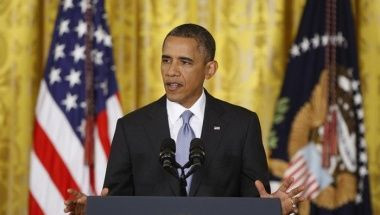NSA FISA Surveillance: The Most Substantive Proposal From Obama’s NSA News Conference

Of the four steps President Obama laid out on Friday to address ongoing concerns about the National Security Agency’s surveillance programs, one stood out as the most substantive and thus most promising: the idea of a special advocate at the secret Foreign Intelligence Surveillance Court (FISC).
For weeks, privacy advocates and members of Congress have called attention to this specific reform, which they felt would aid FISC judges in their task of overseeing the NSA’s surveillance programs. The judges' job has evolved in recent years from merely approving warrants for data collection to issuing long legal opinions and green-lighting massive surveillance operations. Currently, the FISC is set up so that the government makes its requests and argues its side before the court without any pushback. In other words, the proceedings are one-sided. The idea of having a special advocate who represents privacy and civil liberties concerns would allow FISC judges to decide between two opposing points of view with the intended goal being more meaningful oversight of the intelligence community.
“I think we can provide greater assurances that the court is looking at these issues from both perspectives -- security and privacy,” Obama said Friday. “So, specifically, we can take steps to make sure civil liberties concerns have an independent voice in appropriate cases by ensuring that the government’s position is challenged by an adversary.”
This idea has been around for a while, but it gained attention after former NSA contractor Edward Snowden leaked documents detailing the government’s bulk surveillance programs that the FISC was overseeing. In July, retired Judge James Robertson, who served for three years on the FISC, called for an adversary at the court. Coming from a former FISC judge, Robertson’s endorsement gave traction to the idea. Days later, Sen. Richard Blumenthal, D-Conn., announced that he would include the idea in a FISC reform bill he planned to introduce.
The idea seemed to be gaining even more steam during a July 31 Senate Judiciary Committee hearing, when members of both parties brought up the idea and a witness from the Department of Justice said that the proposal was being considered by the administration. On Aug. 1, when a number of lawmakers met with the president to discuss the NSA, Sen. Ron Wyden, D-Ore., a longtime critic of the sweeping surveillance programs, said the issue of a special advocate came into the conversation. It is “a crucial piece of the reform puzzle,” Wyden told reporters after the meeting.
After formally introducing his bill on Aug. 1, Blumenthal expressed confidence that Obama would support it, saying it was “very, very likely” that Obama would sign a bill creating a special advocate because "he’s a good lawyer, he knows the importance of adversarial process.” Now it appears that he was right.
However, the idea still has its skeptics. Though civil liberties and privacy advocates back the reform, they also caution that it is not the only reform needed. At the July public workshop where Judge Robertson plugged the idea, Jameel Jaffer, deputy legal director at the American Civil Liberties Union, cautioned that there were other problems with the secret court, including the fact that it did not have the authority to consider serious constitutional questions. “If we're asking the question whether FISA, whether the oversight of the FISA Court is sufficient I think it's important to keep in mind that there are structural limitations on what the FISA Court can do,” Jaffer said. “The court doesn't have the jurisdiction to consider First Amendment implications of the government's proposed surveillance. It doesn't have the jurisdiction to consider the facial validity of a statute like the FISA Amendments Act.”
In response to Obama’s announcement on Friday, the Electronic Frontier Foundation (EFF), a digital privacy rights group, cautioned that even on this substantive proposal, the devil will be in the details. Without knowing what person, group of people, or organizations will play the adversarial role, and without assurances that they will have access to all necessary information, it’s unclear how useful the special advocate would be. The group also worries that the adversary could end up more worried about national security than the public’s rights he or she is meant to advocate for. “[W]e remain concerned that this position will be subject to capture unless it has at least the sort of independence and protections that public defenders enjoy,” EFF activism director Rainey Reitman wrote in a blog post Friday.
© Copyright IBTimes 2024. All rights reserved.






















